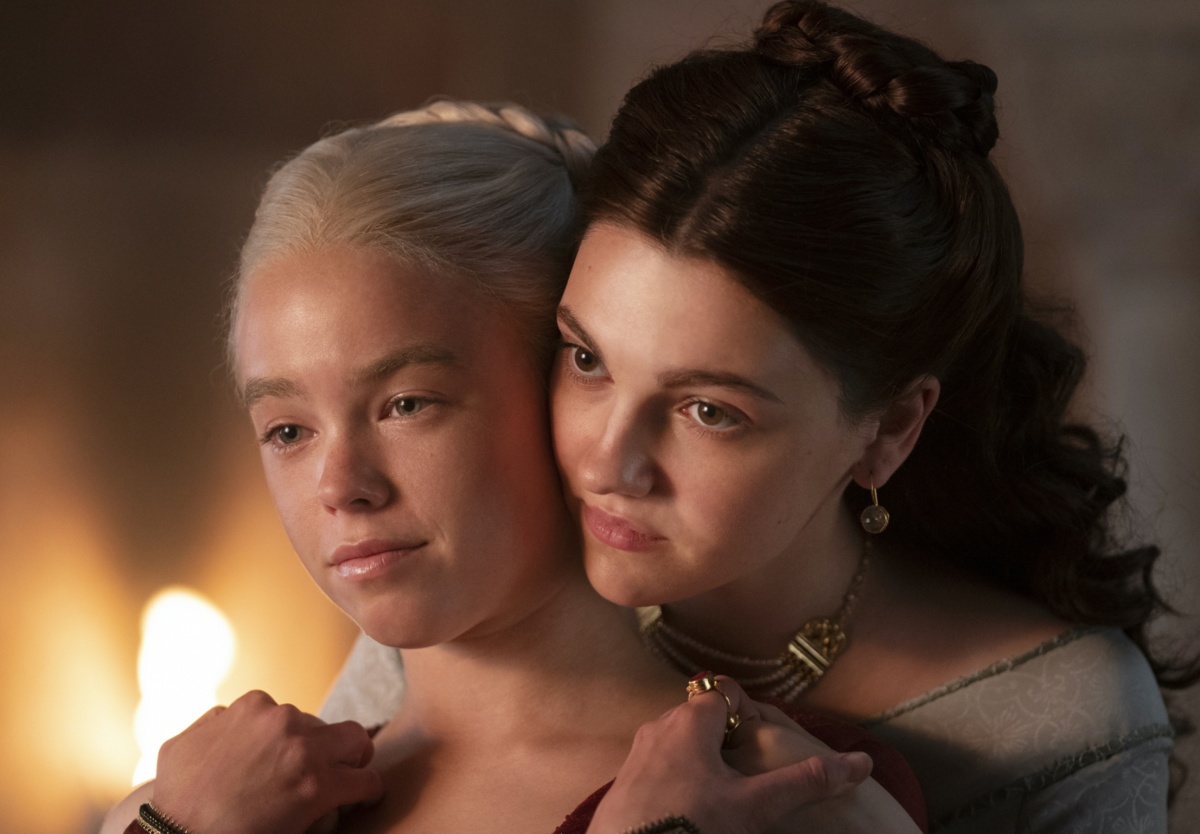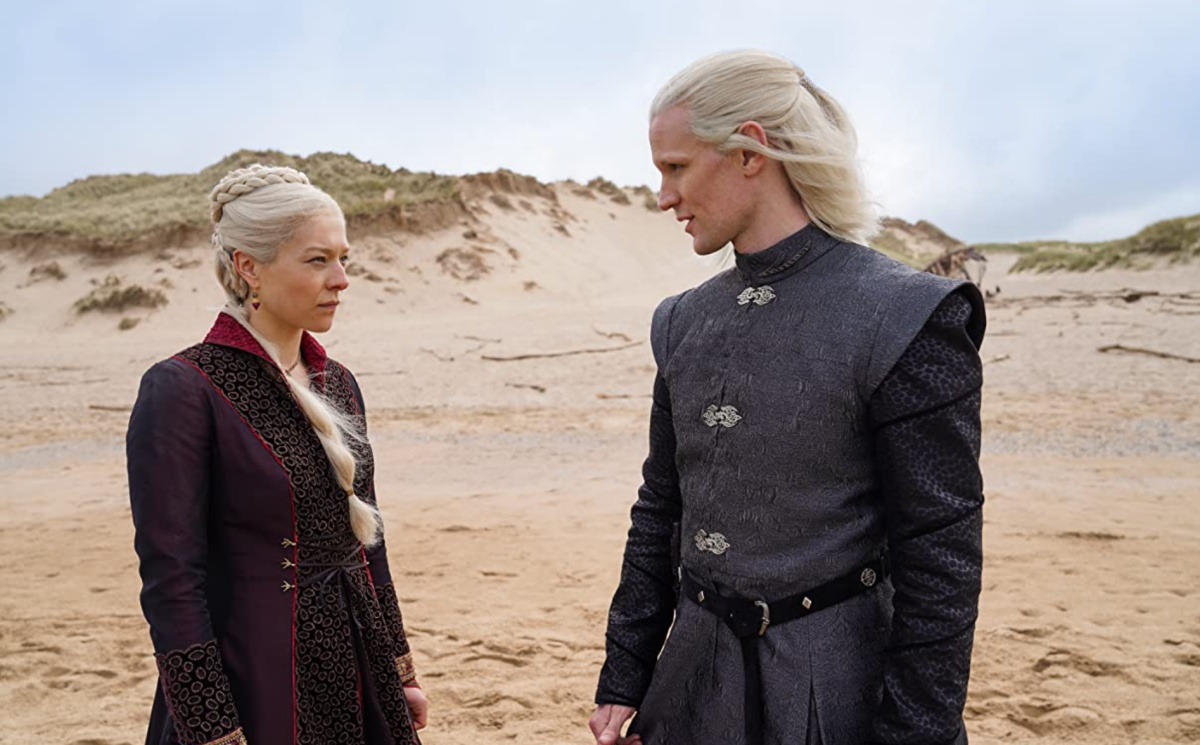‘House of the Dragon’ Brings Fire, Blood, & Bad Wigs Back to HBO

Westeros has a problem, and that problem is male primogeniture. HBO’s Game of Thrones spinoff House of the Dragon takes place during the reign of King Viserys I Targaryen (Paddy Considine). He became king when, under the reign of his grandfather, he was chosen by the council over his elder female cousin, Princess Rhaenys Velaryon (Eve Best). With no male heir and a dead wife, he takes the much younger Alicent Hightower (Emily Carey) as his bride but names his only living daughter, Rhaenyra Targaryen (Milly Alcock), as his heir. This decision will begin the fall of House Targaryen.
Regardless of your feelings about the end of the series, there is no denying that the arrival of Game of Thrones changed the landscape of fantasy and prestige television, for better or for worse. While the books had been around for years at the time of the series premiere, not everyone had read them, and what was once a popular but niche series became an international sensation—one that still has the allure of being half-incomplete with an unpopular show ending, but an alternative ending in the yet-to-be-published novels. It is very Fullmetal Alchemist vs. Fullmetal Alchemist Brotherhood.
For fans of the series who have not followed the books and gotten into the weeds of worldbuilding, House of the Dragon still has much of what made the original series superficially popular: political intrigue, morally complex characters, dragons, a little T&A, and some gory sequences. I’d argue that even book readers can enjoy a more narrative-driven TV exploration of this period in Westeros history.
There is also the issue that it goes through time so quickly that it is hard to attach to any of the minor characters because they swap out, or die, or get barely any screentime. Part of the journey of Game of Thrones was forming an attachment to these characters so when they died or suffered, we felt something. Right now, it is hard to feel anything, but hopefully, as we get into the next four episodes, the stakes will elevate for us.
What does hinder the series in some ways is the fact that we know the conclusion. Until Cersei Lannister, there was no crowned woman on the Iron Throne. Dragons disappear from Westeros before the time of our oldest human characters in Game of Thrones. The Targaryen dynasty dies. In many ways, House of the Dragon is a historical period drama with fantasy elements. It reminds me of my experiences watching historical fictionalized series about the Tudors or The Crown.
The show also chooses to have a linear timeline, so the first set of episodes (the ones we, as the press, have seen) feature Milly Alcock’s version of Rhaenyra and Emily Carey’s version of Alicent. They are supposed to range in age from young teenagers to young adults. It helps with understanding the scope of the time that has passed. I would have much preferred The Witcher’s approach of multiple timelines, but I know some people find that confusing. It isn’t until episode six, the last episode shown to the press to date, that we see the older cast of women (Emma D’Arcy as Rhaenyra and Olivia Cooke as Alicent).

That is not a bug but a feature of watching a prequel where the consequences are already known, even superficially. The acting is fine, and if you have wanted to see Matt Smith playing a complete shithead who fucks, then congratulations, you have the series for you. As Daemon Targaryen, he is both a charismatic presence and also an entitled asshole—a predator, a murderer, and a manipulator with the skills to back it up.
For me, what makes the series interesting is seeing the changes and improvements the series attempts to make in order not to be tainted by the original series, especially when it comes to gender. From the pilot episode, where we get a very gruesome depiction of a c-section, we are told of what it means to be a woman in this world. Even a royal one is not as valuable as a living male heir.
Rhaenyra and Alicent’s transformation from childhood friends into political rivals is fantastically tragic. The men in their lives have made them see each other as enemies because if one rises up, the other must fall—a prophecy that only comes to pass because they choose to fight. It also makes it so that Alicent ends up leaning into all the sexism of the period because she wants to make sure her sons are protected.
We don’t see any sexual assault in the series thus far (as promised), and there is more equal opportunity nudity. It still feels largely excessive, but it is there. Race is very casually handled in the series, with multiple Black and Brown characters. I am at least happy to see that regardless of race, the silver Valyrian hair wigs look terrible. We do get a major gay character who is at least treated with some dignity, but even that is a little messy, all things considered.
I don’t know if House of the Dragon will please all Game of Thrones fans, but it is still a solid fantasy show. It doesn’t have a “throwing Bran out the window” moment, but it doesn’t shy away from how incestuous the Targaryens were. It has something to say about gender, but even so, there isn’t much female solidarity.
Nice to see dragons, though.
(featured image: HBO)
Have a tip we should know? [email protected]
